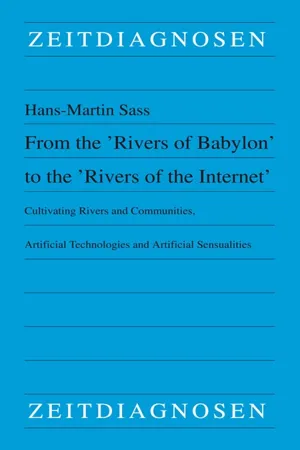
From the 'Rivers of Babylon' to the 'Rivers of the Internet'
Cultivating Rivers and Communities, Artificial Technologies and Artificial Sensualities
- 104 pages
- English
- PDF
- Available on iOS & Android
From the 'Rivers of Babylon' to the 'Rivers of the Internet'
Cultivating Rivers and Communities, Artificial Technologies and Artificial Sensualities
About This Book
The 'rivers of Babylon' were built 3500 years ago by technical and political leaders between Euphrates and Tigris, creating the high culture of Mesopotamia, cultivating dry desert lands into fertile soil, built central cities and the Gardens of Semiramis, using the waterways for exchange of communication, commerce, and control. The 'rivers of the Internet' are built in the 21st century creating integrated cultures of people, of things and everything, of geospaces and cyberspaces, of artificial intelligence (AI) and artificial sensuality (AS), changing individuals, cultures and politics, creating newly integrated state and non-state bodies of culture, commerce, control, politics, and power. New tools and technologies have changed our ideational, environmental, economic, political and cultural biotopes, but people and communities are still good or bad as they were 3500 years ago. Hegel measured progress in world history via the 'progress of the 'consciousness of freedom' in communities and civilizations. The Hegelian geography teacher and 1848 rebel Ernst Kapp measured progress in world history via the 'cultivation of lands and communities by tools and technologies'. Should we understand World History as unilinear (Hegel), or rotating (Polybius), or spiraling (Burckhardt), or conditional on tools and techniques (Kapp), or based on trends and fashions? Hans-Martin Sass (* 1935 in Hagen /Germany) now lives in Reston, Virginia. He holds faculty positions in philosophy and bioethics at Ruhr University, Bochum, FRG (since 1966), and Georgetown University, Washington DC (since 1980); Honorary Professor at Renmin University (1985) and Peking Union Medical College (2001) in Beijing PRC. 100+ separate publications, 250+ journal articles, 300+ invited lectures.
Frequently asked questions
Information
Table of contents
- Cover
- CONTENT
- PREFACE
- 1 WE OURSELVES CREATE OUR CULTURES AND HISTORIES
- 2 BUILDING COMMUNITIES, CULTUVATING TERRITORIES
- 3 HUMAN CAPACITIES MAKE HISTORY AND CULTIVATE BIOS
- 4 FITNESS AND SICKNESS OF POLITICAL BODIES
- 5 ARTIFICIAL INTELLIGENCES AND ARTIFICIAL SENSUAL COMPANIONS
- 6 STEADINESS AND PLEASURE IN POLITICAL BODIES
- 7 TOOLS AND TECHNOLOGIES CHANGE WORLD HISTORY
- 8 PLAYS AND CULTURES IN MANY PLACES